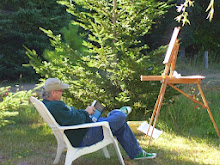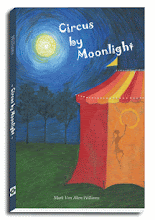As someone once said, “I really want a poem to spout roses and spit bullets.” I agree. It’s no wonder that one of my favorite songs from a while ago was Send Lawyers, Guns and Money by Warren Zevon.
Now I'm hiding in Honduras
I'm a desperate man
Send lawyers, guns and money
The shit has hit the fan
So what constitutes a good poem? For me, it is something that says more in a few words than a novel can in five hundred pages, with wit and word-play. It has an extraordinary mixing of music and image, word and thought. The job of the poet is to choose the right words, not only for sound (the music of poignant language) and connotation (landscape), but even for the countenance of them.
The poem corresponds to a centrifuge of sound, alliteration and rhythm. The reader will be walking into a world for the very first time; a world of terseness and parsimony.
Poetry IS about words!
Another person also said, “What makes a good poem? A good poet.”
So I have two great poets for you to discover this summer: Zbigniew Herbert and Miroslav Holub. They are two of my favorite poets.
Zbigniew Herbert is an avant-garde poet from Poland, who experiments with precise, restrained rhythms. His poetry is continually exposed to the impersonal, external pressures of politics and history. He started writing poetry during the Nazi occupation of Poland, and during the years of Stalinism his poems were continually banned. A. Alvarez says “Irony", such as Herbert’s, “is a two-edged weapon, which turns on the poet as readily as on the world outside. It is based on a sense of his own ineffectual fragility when faced with the steam-roller of political force." His politics is of sanity and survival; something that is completely relevant for this new century.
Also a survivor of WWII, Miroslav Holub was conscripted as a railway worker under the Nazi occupation of Czechoslovakia. He went on to become one of his country’s most important scientists, as a research immunologist at The Institute for Clinical and Experimental Medicine. He argued that, “The emotional, aesthetic and existential value is the same (that scientific method and poetry-making are basically similar)…When looking into the microscope and seeing the expected and when looking at the nascent organism of the poem.” He felt an affinity for the aesthetic of his fellow doctor-poet William Carlos Williams, who is also one of my favorite American poets (along with Wallace Stevens).
So here’s Holub spitting a few bullets at you-
Here too are dreaming landscapes,
Lunar, derelict.
Here too are the masses,
Tillers of the soil.
And cells, fighters
Who lay down their lives
For a song.
Here too are cemeteries,
Fame and snow.
And I hear murmuring,
The revolt of immense estates.
Does anybody have any poets that they would like recommend to me?
Subscribe to:
Post Comments (Atom)







1 comment:
I remember a poem I read once that was all about the items in this man's house. It had a 19th c. feel to it, and he described his travels around the world and all the interesting objects and artifacts he'd gathered and everything in his house that made it home to him. That made it his...and there was this juxtaposition of his home and love for it, but it was populated with objects that he only was able to get by leaving home. And, I loved everything he described.
I suspect poetry to be more powerful than the average person realizes; more capable of inciting passion or change; more able to give comfort than prose.
Poetry is brave, isn't it? It takes something we all use, words, and mixes them up to present a world, or thought, or perspective that is unique and rebellious.
Thanks for the recommendations. Here is a little poem I wrote... I think you should prepare yourself now to get poetry from all over the place.
The brown bird quivers
at what he desires
he cannot reach it
his foot is tethered
his beak is sharp
he considers the leather
in time he's free
in flight, in feather.
Post a Comment